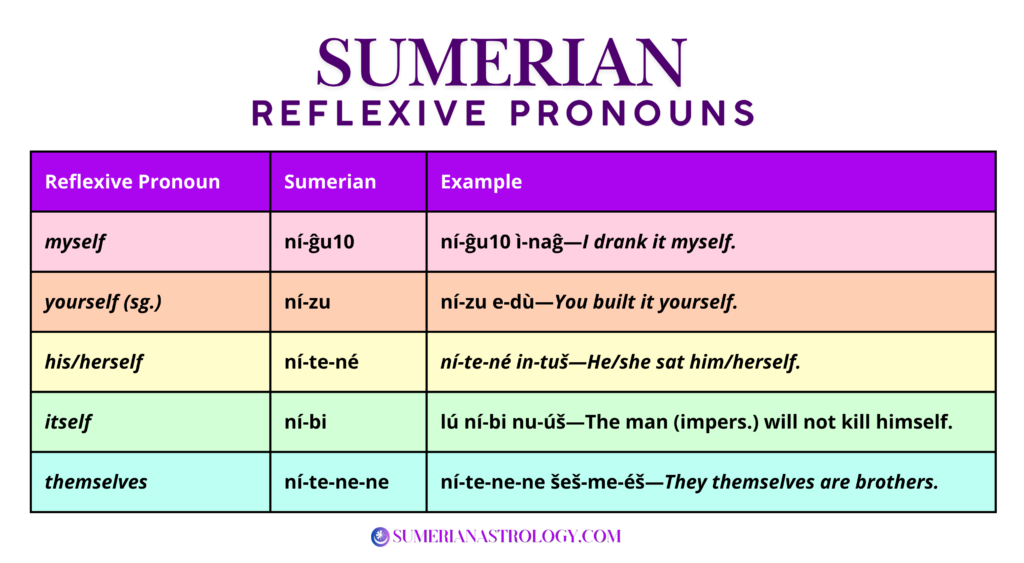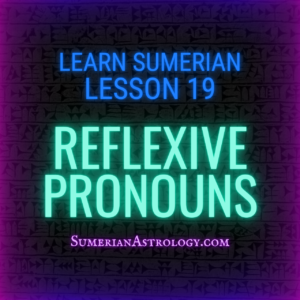You May Want to Review
Helpful Terms
Here are some helpful terms you’ll encounter in this lesson. You can see a full list in the Glossary of Terms.
- reflexive: a grammatical term marking the ability of a verb or pronoun to reflect action or attention back on itself.
Vocabulary to Memorize
I highly recommend memorizing these Sumerian words, as you’ll encounter them often in the upcoming lessons!
- ní-bi 𒉎𒁉 pron., ref., itself.
- ní-ĝu10 𒉎𒈬 pron., ref., myself.
- ní-te-ne-ne 𒉎𒋼𒉈𒉈 pron., ref., themselves.
- ní-te-né 𒉎𒋼𒉌 pron., ref., his/herself.
- ní-zu 𒉎𒍪 pron., ref., yourself.
Vocabulary--Full List
Here are the vocabulary terms for this lesson. Be sure to look them over as they’re updated with additional meanings each lesson. You can see the full Sumerian Lexicon here.
- ak 𒀝 v., to do, act; make into; place. part., suff., of (gen.).
- da 𒉎𒁕 n., arm; edge, line; near, close. v., to be near, hold, protect. part., suff., with (com.).
- dù 𒆕 v., to beget; bear (a child); be born; build, create, fashion, make; transform, change; replace.
- e 𒂊 v., to speak, say; do; water. part., suff., [performed] by (the agent); in, at, beside (directive); plural hamṭu (perfective) suffix; marû (imperfective) singular/plural suffix.
- é 𒂍n., house; temple.
- ĝá 𒂷 v., to come/go. pron., ind., I (especially before a case marker ending in /a/—alternative reading of ĝe26 𒂷). part., suff., poss., my (gen., loc.); nominalizing suffix when preceded by /ĝ/.
- ĝu10 𒈬 pron., poss., my (abs., erg., dir.) (with ra/úr 𒊏/𒌫 (dat.)) (with šè/uš 𒂠/𒍑 (term.)) (with da/ta/gin7 𒁕/𒋫/𒁶 (com., abl., equ.)) (with um 𒌝 before the enclitic copula).
- ì 𒉌 n., butter, oil, fat, cream; oil container. part., pref., stand-alone agentive prefix ‘I’; conjugational prefix (indicates distance from speaker). naĝ 𒅘
- in 𒅔 n., abuse; insult, offense. part., pref., stand-alone agent prefix ‘he/she/it’ (pers.).
- ka 𒅗 n., mouth; opening; beginning, origin; body part. part., suff., ‘of’ (gen.) (mutation of ak 𒀝 when anlaut /a/ assimilates to the proceeding vowel {ĝu10 + ak = ĝá-ka}
- lú 𒇽 n., man, male; human, person.
- me-eš 𒈨𒂠 cop., they are (pl.).
- me(te) 𒈨𒋼 n., body, self, one’s own; creates a reflexive pronoun (with te 𒋼, used before 3rd person pronouns) (OS x5) (NS and OB variation of ní(te) 𒉎(𒋼)).
- ní(te) 𒉎(𒋼) n., body, one’s self, one’s own; creates a reflexive pronoun (with te 𒋼, used before 3rd person pronouns) (NS x8, OB x45); creates a reflexive verb (OS x3, OA x1, NS x300, OB x383).
- ní-bi 𒉎𒁉 pron., ref., itself.
- ní-ĝu10 𒉎𒈬 pron., ref., myself.
- ní-te-ne-ne 𒉎𒋼𒉈𒉈 pron., ref., themselves.
- ní-te-né 𒉎𒋼𒉌 pron., ref., his/herself.
- ní-zu 𒉎𒍪 pron., ref., yourself.
- ní…gíd 𒉎…𒁍 v., to stretch one’s self.
- nu 𒉡 v., to not be. adv., no, not, without.
- ra 𒊏 v., to accompany; bear; drive; go; lead; multiply; mix, stir. part., suff., to/for (dat.).
- šeš 𒋀 n., brother; colleague; assistant.
- tuš 𒂉 n., home. v., to sit, lie down (trans. h. sg.) (h./m. pl. durun 𒂉𒂉; m. sg. dùr 𒂉); to sing; to dwell, reside, be at home, settle; set up, establish.
- úš 𒍗 n., blood, gore; death. v., to block; die; be dead; kill. adj., dead.
Generally speaking, ní 𒉎 can be:
- used as a stand-alone noun
- ní 𒉎 (one’s) self
- used in a compound reflexive verb
- ní…gíd 𒉎…𒁍 to stretch one’s self
- modified by a possessive pronoun
- ní-ĝu10 𒉎𒈬 myself
- modified by a possessive pronoun and case
- ní-ĝu10-da 𒉎𒈬𒁕 with myself
NOTE: The “…” between ní 𒉎 and gíd 𒁍 acts as a place-holder for the verbal chain infixes. You may also see it as “—”, as in ní—gíd.
Creating Reflexive Pronouns
Reflexive pronouns are created by suffixing the appropriate possessive suffix to ní(te) 𒉎(𒋼):
- ní-ĝu10 𒉎𒈬 myself
- ní-zu 𒉎𒍪 yourself
- ní-te-né 𒉎𒋼𒉌 his/herself
- ní-bi 𒉎𒁉 itself
- ní-te-ne-ne 𒉎𒋼𒉈𒉈 themselves
NOTE: The 1st and 2nd person plural forms of ‘ourselves’ and ‘yourselves’ are unattested.
With the genitive -ak 𒀝, ní(te) 𒉎(𒋼) becomes one’s own:
é ní-ĝá-ka 𒉎𒂷𒅗 in my own house (lit. in the house of myself)
NOTE: In the above construction, the /u/ of ĝu10 𒈬 assimilates with the /a/ of ak 𒀝, resulting in ĝá-ka 𒉎𒅗, as the /k/ of ak 𒀝 cannot appear by itself, and becomes ka 𒅗 {ĝu10 + ak = ĝá-ka}. We’ll discuss the genitive case marker and its mutations in a later lesson.

Sumerian Reflexive Pronouns in Use
Here are some examples of Sumerian reflexive pronouns in use. These are all built using phrases you’ve encountered in previous lessons, so if they don’t look familiar, you may want to go back and review. However, we’ll be digging deeper into Sumerian sentences and phrases in future lessons, so you’re welcome to wait!
- ní-ĝu10 ì-naĝ 𒉎𒈬𒉌𒅘 I drank it myself.
- ní-zu-ra e-dù 𒉎𒍪𒊏𒂊𒆕 You built it for yourself.
- lú ní-bi nu-úš 𒇽𒉎𒁉𒉡𒍗 The man will not kill himself.
- ní-te-né in-tuš 𒉎𒋼𒉌𒅔𒂉 He/she sat him/herself.
- ní-te-ne-ne šeš-me-éš 𒉎𒋼𒉈𒉈𒋀𒈨𒂠 They themselves are brothers.
Your Sumerian Language Journey Continues!
In the next lesson, you’ll learn about Sumerian interrogative pronouns, so be sure to subscribe to my substack to get all of my articles as soon as they post!











